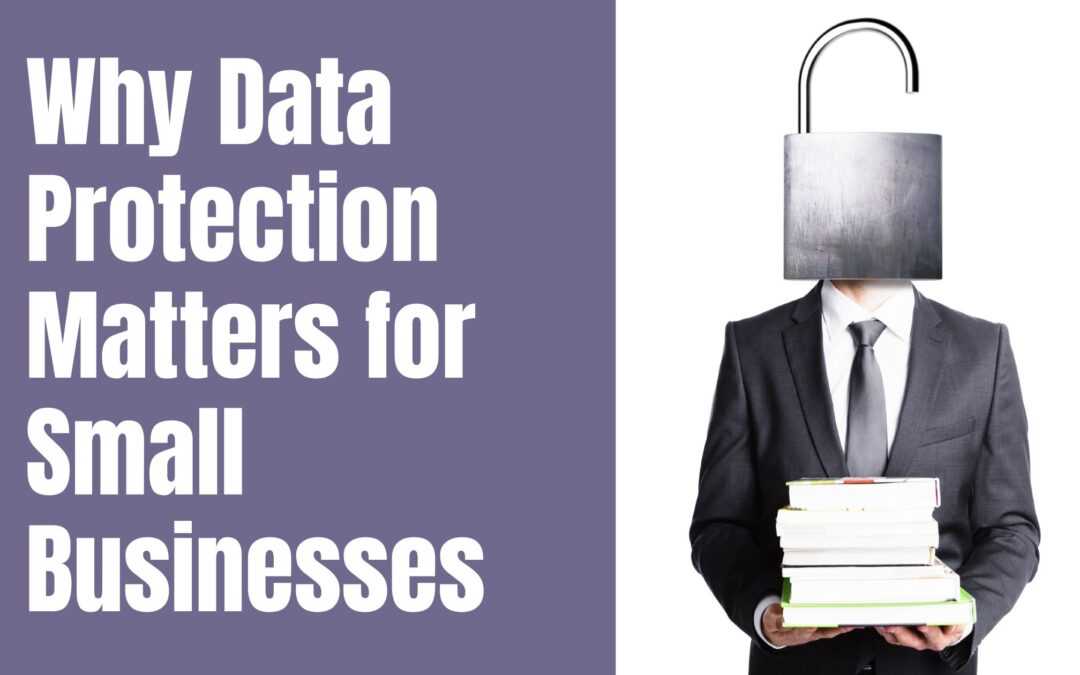Imagine you’ve just won the “Small Business of the Year” award, and suddenly your customers’ data is compromised. Nightmare, right?
Data protection might not be the most glamorous part of running a business, but it’s as essential as your morning cuppa.
Whether you’re a fresh-faced start-up or a seasoned entrepreneur, nailing your data protection practices can save you heaps of trouble down the road.
Here’s why it matters and how to get it right.
1. Customer Trust and Transparency
Your customers care deeply about what happens to their personal data. They want to know how you plan to use it and have a say in its management.
By proactively informing your customers about your data protection practices through clear privacy notices, you build trust and loyalty.
This transparency not only complies with the law but also sets your business apart as a trustworthy and responsible entity.
2. Data as a Business Asset
Data is the lifeblood of modern businesses. Without it, fulfilling contracts, completing orders, and managing day-to-day operations would be a struggle.
Implementing robust data security measures ensures that this vital resource is protected against breaches, theft, or misuse.
This not only safeguards your operations but also maintains the integrity and continuity of your business.
3. Staying Ahead with Regular Compliance Checks
The business world is fast-paced, and relying on outdated methods can put your data at risk.
Regularly reviewing and updating your data protection practices ensures that you stay compliant with current regulations and protect your business from potential breaches.
This proactive approach helps you avoid legal pitfalls and keeps your business running smoothly.
4. Competitive Advantage through Compliance
Many larger organisations require their suppliers to have data protection policies in place.
By adhering to these standards, you not only comply with the law but also enhance your business’s credibility.
This can give you a competitive edge when bidding for contracts and collaborating with businesses that prioritise ethical and responsible practices.
5. Cost and Time Efficiency
Investing in data protection compliance saves time and money in the long run.
Avoiding issues such as data breaches and formal complaints reduces operational disruptions and legal costs.
Moreover, good data protection practices, like not keeping data longer than necessary, streamline your processes. This makes it easier and cheaper to manage essential information.
6. Proactive IT Security Measures
Securing your IT infrastructure is crucial.
Regularly testing your systems, using up-to-date antivirus software, and training your staff on data security best practices can prevent breaches.
Each business faces unique risks, so tailor your security measures to fit your specific needs.
This proactive approach ensures that your business is resilient against cyber threats.
7. Legal Compliance and Practicality
While fines and penalties for non-compliance make headlines, the foundation of data protection law is common sense.
Ensuring that everything you do with personal data is legal, fair, and clear to the data subjects helps you avoid legal issues.
Using tools and checklists provided by regulatory bodies like the ICO can simplify compliance.
8. Effective Data Sharing
Properly managing and sharing personal data is essential for maintaining smooth operations and enhancing services.
By ensuring that data sharing is done correctly and for legitimate reasons, you keep your business efficient and your customers satisfied.
9. Respecting Data Subject Rights
Data protection isn’t just about securing data; it’s also about respecting individuals’ rights over their information.
Be prepared to handle subject access requests (SARs), objections to data use, and requests for data correction or deletion.
Taking these requests seriously and responding promptly is not only a legal obligation but also a way to maintain trust.
10. Handling Data Breaches
If a data breach occurs, knowing how to respond is crucial.
Serious breaches must be reported to the ICO within 72 hours. Familiarise yourself with the steps to take when a breach happens to mitigate damage and comply with legal requirements.
Understanding the risk associated with different breaches helps you manage incidents effectively.
11. Lawful Basis for Data Processing
Every action you take with personal data must have a lawful basis. Choose the appropriate basis for your data processing activities and stick to it.
This ensures that your data practices are justified and legally sound.
12. Understanding Exemptions
Not all data is subject to data protection laws. Information about deceased individuals or non-personal data, such as company financial records, is exempt.
Understanding these exemptions helps you focus your compliance efforts where they are needed most.
13. Staff Training and Awareness
Your employees play a vital role in data protection. Regular training ensures that they understand their responsibilities and can handle data correctly.
This includes being aware of their own rights as employees and knowing how to manage data requests from customers.
14. Funding the ICO’s Work
Paying the data protection fee is a legal requirement for most businesses.
This fee supports the ICO’s work in regulating and assisting businesses with data protection compliance.
Check if your business is required to pay and ensure timely payment to avoid fines.
15. Ongoing Commitment
Data protection is an ongoing process, not a one-time task.
Continuously improving your practices and staying informed about regulatory changes ensures long-term compliance and protects your business from evolving threats.
For more detailed information on data protection compliance, visit gov.uk/data-protection.
By prioritising data protection, small businesses can build trust, ensure compliance, and create a secure environment for both customers and operations.

